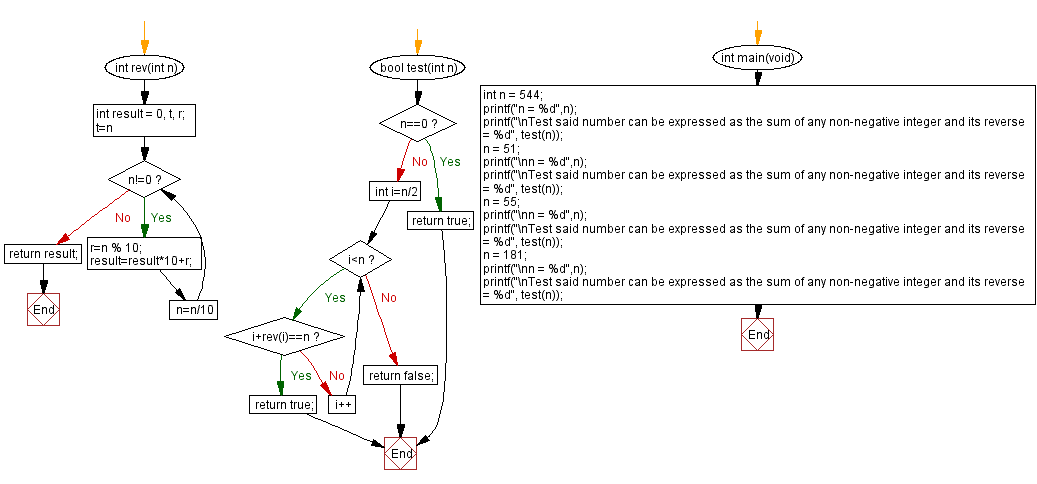C Programming: Number sums and their reverses
32. Sum with Reverse Expression Variants
Write a C programming to check whether a given integer can be expressed as the sum of any non-negative integer and its reverse. Return true otherwise false.
Example:
Input: = 554
Output: true
Explanation: 371 + 173 = 554
Input: = 51
Output: false
Explanation: It cannot be expressed as per said condition.
Input: = 55
Output: true
Explanation: 41 + 14 = 55
Input: = 181
Output: true
Explanation: 140 + 041 = 181
Test Data:
(554) -> 1
(51) -> 0
(55) -> 1
(181) -> 1
Sample Solution:
C Code:
#include <stdio.h>
#include <stdlib.h>
#include <stdbool.h>
// Function to reverse an integer
int rev(int n){
int result = 0, t, r;
for(t = n; n != 0; n = n / 10){
r = n % 10; // Extracting the rightmost digit of 'n'
result = result * 10 + r; // Building the reversed number
}
return result;
}
// Function to test if a number can be expressed as the sum of any non-negative integer and its reverse
bool test(int n){
if(n == 0) return true; // If the number is 0, it can be expressed as the sum of itself and its reverse (0)
for(int i = n / 2; i < n; i++){ // Loop from n/2 to n-1 to find the sum of 'i' and its reverse equal to 'n'
if(i + rev(i) == n){ // Check if 'i' + its reverse equals 'n'
return true; // If found, return true
}
}
return false; // If no such 'i' exists, return false
}
// Main function
int main(void) {
int n = 544;
printf("n = %d",n);
printf("\nTest said number can be expressed as the sum of any non-negative integer and its reverse = %d", test(n));
n = 51;
printf("\nn = %d",n);
printf("\nTest said number can be expressed as the sum of any non-negative integer and its reverse = %d", test(n));
n = 55;
printf("\nn = %d",n);
printf("\nTest said number can be expressed as the sum of any non-negative integer and its reverse = %d", test(n));
n = 181;
printf("\nn = %d",n);
printf("\nTest said number can be expressed as the sum of any non-negative integer and its reverse = %d", test(n));
}
Sample Output:
n = 544 Test said number can be expressed as the sum of any non-negative integer and its reverse = 1 n = 51 Test said number can be expressed as the sum of any non-negative integer and its reverse = 0 n = 55 Test said number can be expressed as the sum of any non-negative integer and its reverse = 1 n = 181 Test said number can be expressed as the sum of any non-negative integer and its reverse = 1
Flowchart:

For more Practice: Solve these Related Problems:
- Write a C program to check if an integer can be expressed as the sum of a non-negative integer and its reverse.
- Write a C program to test numbers for the property of being equal to the sum of a number and its reversed digits.
- Write a C program to iterate through potential candidates and verify the sum-with-reverse condition using string reversal.
- Write a C program to determine and print all numbers within a range that satisfy the reverse sum property.
Go to:
PREV : Largest Number from One Swap Variants.
NEXT : Count Dividing Digits Variants.
C Programming Code Editor:
Improve this sample solution and post your code through Disqus.
What is the difficulty level of this exercise?
Test your Programming skills with w3resource's quiz.
